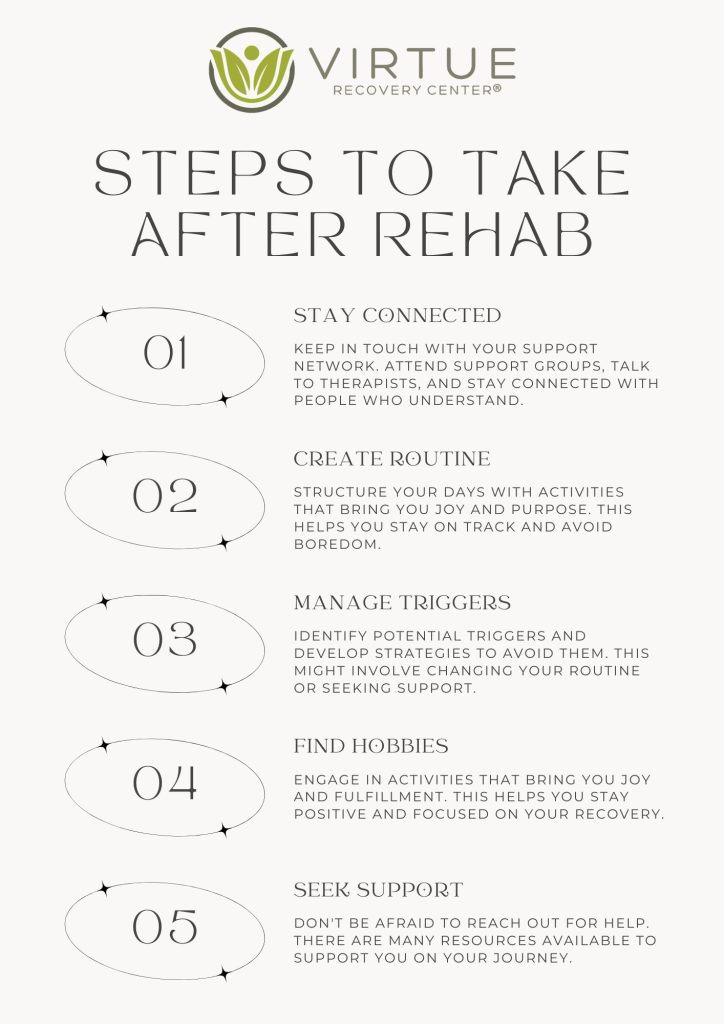Key Takeaways
- Life after rehab requires strong routines, support, and personal growth.
- Building a support system and staying connected to treatment programs help protect sobriety.
- Triggers and cravings are part of recovery but can be managed with healthy coping tools.
- New hobbies and a sense of purpose help create a joyful life after addiction.
- Seeking ongoing support strengthens your recovery journey and prevents relapse.
Introduction
Leaving rehab is a huge milestone. You’ve worked hard to heal your mind and body from addiction. Now, as you step back into everyday life, you might feel excited—and a little scared, too. That’s normal. Life after rehab is full of possibilities, but it also comes with challenges. Recovery isn’t a one-time event. It’s a journey, and every day is a step forward. In this article, we’ll share real-world tips to help you stay sober, manage challenges, and create a beautiful, fulfilling life after addiction. You deserve it!Understanding Life After Rehab
Rehab gives you a strong foundation. It teaches you about addiction, coping skills, and how to live without drugs or alcohol. But once you leave treatment, the real work begins. In early recovery, it’s common to feel a lot of emotions all at once:- Hope and excitement about the future
- Fear of failing or relapsing
- Loneliness or uncertainty
Building a Strong Support System
One of the most important things you can do after rehab is build and protect your support system. This might include:- Family members who care about your health
- Friends who respect your sobriety
- Sponsors and peers from a 12-step program like Alcoholics Anonymous (AA)
- Therapists and counselors from your treatment center
Creating Healthy Routines
Having a daily structure can make a huge difference in your recovery journey. Without a plan, boredom and stress can creep in—and that’s when cravings can get stronger. Try to build healthy routines like:- Starting your day with a purpose (set a goal every morning)
- Eating regular, healthy meals
- Exercising (even a short walk counts!)
- Spending quiet time for reflection, prayer, or meditation
- Setting regular sleep and wake times
Managing Triggers and Cravings
Triggers are anything that makes you want to drink, use drugs, or escape your feelings. Triggers can be:- Stress
- Arguments
- Old friends who still use
- Certain places or smells
- Taking deep breaths to calm your body
- Calling someone from your support network
- Using coping skills you learned during treatment
- Distracting yourself with a hobby or quick walk
Finding Purpose and New Interests
Recovery isn’t just about stopping drug or alcohol use. It’s about building a life you love so much that you don’t want to go back. This means finding new hobbies and interests that bring you joy. Some ideas include:- Volunteering for a cause you believe in
- Learning a new skill like painting, cooking, or coding
- Joining a fitness class or sports league
- Going back to school or starting a new career path
Dealing with Setbacks Without Shame
No recovery journey is perfect. Some days are harder than others. Some people even slip or relapse. If that happens, it’s important to:- Tell someone right away—don’t hide or feel ashamed.
- Look at what happened without judgment.
- Get back on track by adjusting your recovery plan.
- Remind yourself: A slip does not erase your progress.
Steps to Take After Rehab
To help you stay strong after rehab, we’ve created a simple checklist you can follow every day.
Why Ongoing Professional Help Matters
Many people find that even after rehab, outpatient treatment, therapy, or support groups are key to staying sober long-term. You don’t have to do it all alone. Professional support can help you:- Work through tough emotions
- Learn new coping skills
- Build stronger relationships
- Prevent relapse before it happens
Conclusion
Adjusting to life after rehab is a brave and beautiful step. You have already proven your strength by choosing recovery. Every day you stay sober, you build a better future for yourself. It’s okay to feel overwhelmed sometimes. What matters most is staying connected, taking small positive steps every day, and reaching out for help when you need it. You deserve a life filled with hope, purpose, and joy. Call Virtue Recovery Las Vegas at 866-520-2861 today to connect with a compassionate team who can help you build your new life in recovery.How Can Understanding Detox and Residential Treatment Help in Adjusting to Life After Rehab?
Understanding detox vs rehab is crucial for a smooth transition back to daily life after treatment. Detox helps manage withdrawal symptoms, while rehab provides essential coping strategies. Together, they equip individuals with the knowledge and tools to face triggers and challenges, fostering a sustainable recovery and healthier lifestyle.








